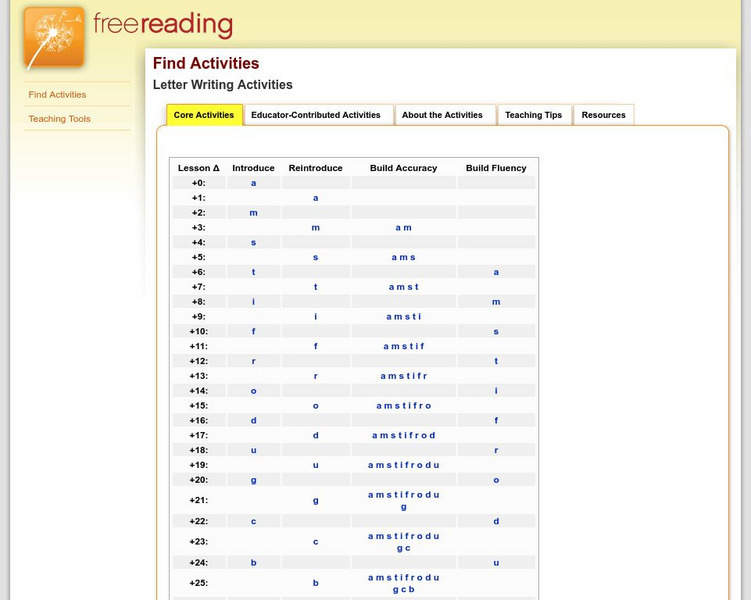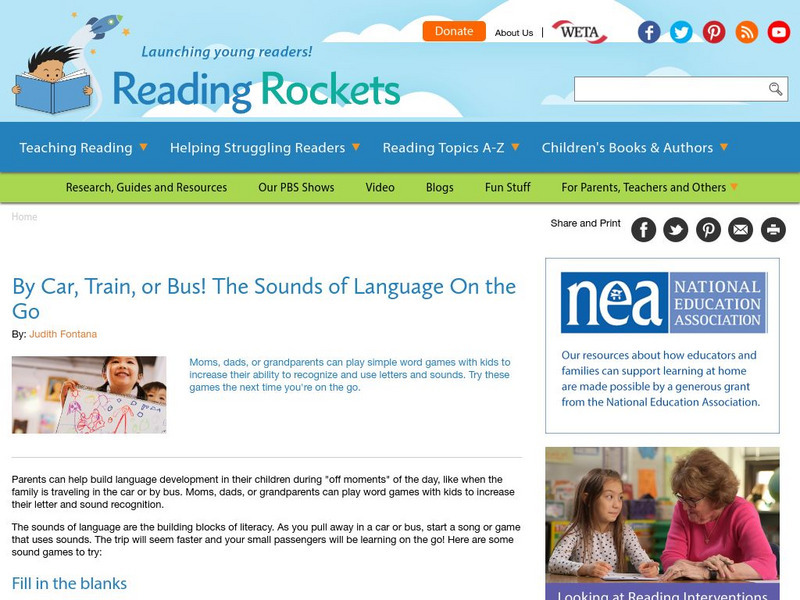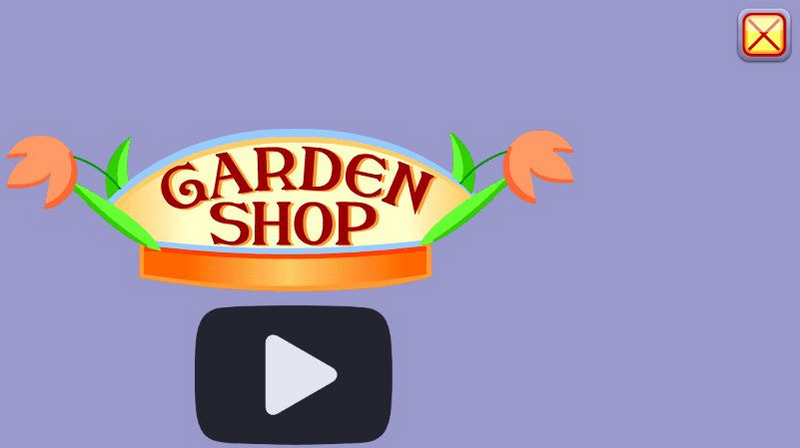Hi, what do you want to do?
Curated OER
Give a Hoot About Owls
Students research basic information about owls. They complete a class KWL chart, and conduct research on owls using the Internet and a variety of resource books. Next, they write an owl acrostic poem and a report using their research...
Curated OER
Language Arts: Plotting Stories
Second graders read the story, "The Foolish, Timid Rabbit," as part of a unit on appearances. After reading with partners, they write their own stories that include elements about some forms of matter from their science studies. Students...
Curated OER
Regulating Gene Expression
In this gene expression worksheet, students read about two transcription factors: activators and repressors. Students complete 1 multiple choice and 5 short answer questions.
Curated OER
Learning about Maps and Colors
First graders discuss "Harold and the Purple Crayon" and his drawings. In this neighborhood geography instructional activity, 1st graders learn to detect and classify places on a map including their home. Students recognize their address...
Curated OER
Teaching Phonics Through Poetry
Students understand rhythm and rhyming words in poetry. In this poetry lesson, students listen to poetry and are able to find the ABAB pattern. Students recognize the "ow" sound. Students complete various activities to practice the...
Curated OER
Celebrate Comprehension with Classical Characters
Students listen to books and answer questions using reading skills. In this reading lesson, students develop reading strategies such as decoding, understanding characters, and comprehension. Students relate characters and events in the...
Curated OER
A Center Approach to Poetry
Students experience the different types of poetry in order to classify them. In this poetry lesson, students discover the multiple types of poetry while reading in the library. Ultimately, the students create their own poetry and share...
Curated OER
The Crash, the Dust, and the New Deal
Students explore the Great Depression. In this American history lesson, students examine primary sources in order to research the Stock Market Crash of 1929, the Dust Bowl, and the Neal Deal. Students study the impact on these events on...
Curated OER
Indian Removal: Does History Always Reflect progress?
Students explore the idea that progress for some might not mean progress for all. In this Native American activity, students recognize different viewpoints about historical events through the study of primary documents. Students decipher...
Curated OER
Why Koala Has A Stumpy Tail
Learners practice reading comprehension of an Australian folktale. In this Australian folktale instructional activity, students read the story, Why Koala Has a Stumpy Tail, before completing retells with character puppets, discussing...
Curated OER
Where Will I Go From Here?
Students research the various cultures in Colonial America. In this American history lesson, students analyze and complie the research they find presenting what they have found into a short presentation.
Curated OER
Animal Coverings
Students read a book. In this animal characteristics lesson, students read the book Animal Coverings, answer comprehension questions, and complete a chart where they match animals with their coverings.
Curated OER
The Farmer Cares for the Land
Students explore farming by creating visual demonstrations. In this agriculture lesson, students read assigned text about a farmer's duty and identify the events that have taken place in the history of agriculture. Students collaborate...
Curated OER
Brain Awareness Week
Students explore human anatomy by completing a list of activities over five days. In this brain science lessons, students examine images of brains and identify the different parts. Students complete an in-class quiz regarding brain...
Curated OER
Brain Awareness Week Lessons
Students explore the human brain and nervous system. In this brain awareness instructional activity, students examine specific terms with regards to the human brain. Students discover the brain's structure and function and how it...
TED Talks
Ted: Ted Ed: How to Sequence the Human Genome
Your genome, every human's genome, consists of a unique DNA sequence of A's, T's, C's and G's that tell your cells how to operate. Thanks to technological advances, scientists are now able to know the sequence of letters that makes up an...
Starfall
Starfall: Letters of the Alphabet
This site features activities for the letters of the alphabet. Students have an opportunity to click on a letter and hear a story about that letter.
BBC
Bbc Skillswise: Reading: Recognizing Letters and Words
Learn the importance of alphabetic sequence and using common letter patterns to support fluency. For adult learners.
Free Reading
Free Reading: Letter Writing Activities
This invaluable site helps instructors teach students how to handwrite each letter of the alphabet. It includes the amsti sequence to introduce letters, followed by fluency-building activities and accuracy-building activities. Additional...
Polk Brothers Foundation Center for Urban Education at DePaul University
De Paul University: Center for Urban Education: Letter to Grandmother [Pdf]
"Letter to Grandmother" is a one page, fictional, reading passage about a family of early settlers who moved west. A girl writes a letter to her grandmother telling her about their new life on the plains. It is followed by...
Reading Rockets
Reading Rockets: By Car, Train, or Bus! The Sounds of Language on the Go
Come and check out this awesome pre-reading resource. This site offers examples of simple word games you can play with kids to increase their ability to recognize and use letters and sounds. Try these games the next time you're in the...
Starfall
Starfall: Garden Shop
Interactive games identifying letter sounds using picture cues. Sequencing and word families are emphasized. Other links include audio books and short videos.
Free Reading
Free Reading: Free Reading: Sounding Out Activities
A wonderful site full of tips for teaching the skills of sounding out words. This site has a plethora of links that provide an excellent way to practice and memorize the essential skills of sounding out words. The links using every...
Reading Rockets
Reading Rockets: The Alphabetic Principle
Children's knowledge of letter names and shapes is a strong predictor of their success in learning to read. Knowing letter names is strongly related to children's ability to remember the forms of written words and their ability to treat...
























![De Paul University: Center for Urban Education: Letter to Grandmother [Pdf] Unit Plan De Paul University: Center for Urban Education: Letter to Grandmother [Pdf] Unit Plan](https://static.lp.lexp.cloud/images/attachment_defaults/resource/large/FPO-knovation.png)



